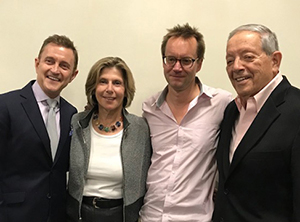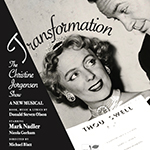On Sammy Cahn
Songs & Stories with Harvey Granat
92nd Street Y, NYC, May 17, 2018
Reviewed by Alix Cohen for Cabaret Scenes

Today, raconteur/vocalist Harvey Granat’s entertaining midday series reprises 2015’s On Sammy Cahn. An entrepreneur and fan, our host produced Cahn on Broadway in partnership with Alexander Cohen. When Granat suggested moving the show from Lyrics & Lyricists, Cahn listed everything with which he was involved, adding, “the most I could give you is two or three years.” Words and Music opened at The Golden Theatre in 1974, then toured both nationally and abroad. Cahn had a helluva time and the two became great friends.
“Could a show like that succeed today?” Granat asks Michael Riedel. “Well, we have jukebox musicals, but people buying tickets today are boomers and Sammy’s before that….” (Bruce Springsteen’s uber-successful Broadway run is pointed out as an exception.) The journalist doesn’t feel the American Songbook resonates with theater-goers today. I wonder. I have many caveats about the current production of My Fair Lady, but it seems to be packing them in. Nor is Carousel suffering. Encores! turns people away.
In quick defense, Amy Goldberg (Cahn’s niece) points out that it’s meat and potatoes to so many cabaret singers, but adds that because the great lyricists are no longer here to talk about their work, she stopped subscribing to Lyrics & Lyricists. I disagree. The last L&L featured the extremely talented, highly successful Lynn Ahrens. There are many young practitioners around today who might be tapped as well as some of the old guard that could be introduced to a new generation of prospective fans.
Samuel Cohen aka Sammy Cahn (1913 –1993) accrued 26 Academy Award nominations (winning four), and an Emmy for “Love and Marriage.” The latter premiered in 1955’s musicalization of Thornton Wilder’s Our Town (Frank Sinatra played The Stage Manager) and was popularized as the theme song for FOX TV’s Married…with Children. Ol’ Blue Eyes would go on to record 89 Cahn songs, more than any other lyricist.
When the Sinatras walked in to Cahn’s invitation-only funeral, Golberg notes, “…everything stopped. They were escorted to the front and my mother heard Frank to say his wife, ‘Now it’s all over.’”
The lyricist’s first effort, “Like Niagara Falls, I’m Falling for You,” may have passed without note, but he steadfastly plugged on. Granat imitates Cahn’s audition for Vitaphone just as it was enacted for him. “Please Be Kind” (written with Saul Chaplin) arrives with New York street accent, dreadful phrasing, and stiff gesture. “What the Hell does that mean, your heart will lose its mind?!” the producer had exclaimed…this song will never make it!” We know otherwise. Granat sings an excerpt in his own lovely, inimitable style. “Lesson learned? Never write a lyric you have to explain.”
In the 1940s, Cahn wrote hit after hit with Jule Styne. We hear a tandem “Guess I’ll Hang My Tears Out to Dry” and “I’ll Only Miss Her When I Think of Her” with tender arrangement by MD David Lahm. Granat exudes melancholy resignation. “Time After Time,” especially requested by Debbi Bush Whiting, is affectionate and thoughtful. His voice is rich and full, creating impact without resorting to excess volume.
Cahn and Styne were asked to write the title song for Three Coins in the Fountain without, as was traditional then, seeing the film. Twentieth Century Fox suggested he might want to mention Rome (where the story takes place). When the number was returned for lack of a bridge, the lyricist was furious at being questioned. He sent it back with the worst bridge he could think of: “Which one will the fountain bless? Which one will the fountain bless?” Granat demonstrates his attitude. It became the number one song in the country and won an Academy Award.
Broadway endeavors began with Glad to See Ya starring Phil Silvers in 1944. Three years later, High Button Shoes had more success. (Both with music by Styne), Skyscraper (music: Jimmy Van Heusen), Walking Happy (music: Van Heusen), and Look to the Lillies (music: Styne) followed. “It was a big disappointment to Cahn that he never had a Broadway hit.” (Riedel) Looking forward, the lyricist was writing Mr. Bojangles with Charles Strouse when he passed.
Cahn could apparently concoct a song about anything and do it quickly. Tita (his wife) told Riedel, “Sammy could walk down the street and write lyrics to a jackhammer.” (Mrs. Cahn would have been here today, but she’s under the weather.)
Granat introduces Jeff Harnar, whose CD, Sammy Cahn—All the Way is a classic. A master of intimacy, the performer offers “All the Way” approaching audience members, focusing on a personal level: “…but if you let me love you…” he sings tenuously, hopeful. “Come Fly with Me” swings as Harnar flirts. “Ain’t That a Kick in the Head” sounds like a down-and-out shrug. “(Love Is) The Tender Trap” is ingénue fresh: “…you’re hooked, you’re cooked, you’re caught….” He bounces from his knees.
To my mind, Harnar is this generation’s Mel Tormé. It’s not that his sound is similar, but the vocalist too personifies skilled musicality, seemingly effortless finesse, and sincerity that connects. He delivers material as authors intended. When I tell him this, Harnar responds that Julie Wilson made the same observation.
Examples of Cahn’s famous song parodies include: “You made me love you/You woke me up to do it”; “This is my first affair/so what goes where”; “Time after time/I tell myself that I’m/So lucky to be Jule Styne”; and “It’s impossible/To make love in a Toyota”
The pitfalls of using songs for television commercials—“let it mow, let it mow, let it mow” (not “snow”) had been suggested by a lawnmower company-—and the uphill climb of keeping them in public awareness are discussed. (We could’ve asked Whiting who manages the output of Margaret and Richard Whiting.) Granat then sings “Call Me Irresponsible” from the film Papa’s Delicate Condition, or as Cahn called it, Papa’s Delicatessen. A one-syllable guy from an immigrant family on the Lower East Side, the lyricist evidently bragged about writing around a five-syllable title. Granat’s version swings.
We close with one of the host’s favorite lyrics, “All My Tomorrows” (music: Van Heusen): “Today I may not have a thing at all/Except for just a dream or two/But I’ve got lots of plans for tomorrow/And all my tomorrows belong to you.” The character seems to be making first-time promises. Believe me, he says both to the woman and himself. It’s simply lovely. Goldberg recalls being in the house when Jack Jones came to play the first recording for Cahn. Oh, to have been a fly on the wall.
NEXT: Dorothy Fields Part II with Guests: Fields’ son, David Lahm, and Julie Budd
June 14, 2018






Sammy Cahn had a Huge Broadway Success with “High Button Shoes”, and I’m Delighted to see that Encores is Reviving the show This Season. It’s one of the Fastest and Funniest Broadway Musicals of All-Time: Phil Silvers, Joey Faye, Nanette Fabray — Unbeatable!!